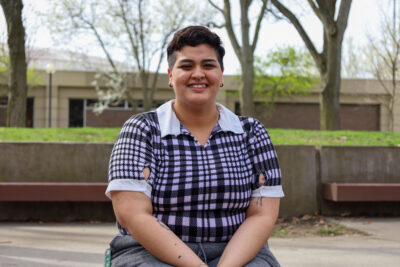I appreciated Sam Foxvog’s final sentence in last week’s article on the Symposium: “We each hold pieces of the truth.” This article is simply my piece of the truth that I have been eager to share for a while now.
Statistics and facts are obviously an important aspect of debating about topics so steeped in politics and economy. However, I firmly believe that looking at the broader picture and including personal experience is also crucial to these conversations. Regarding the pay gap between women and men, not only are there arguments about whether or not we should even be concerned about this issue (what if the pay gap is actually women’s fault??), but some of these arguments fail to even mention the fact that, for example, Latina women don’t get paid as much as white women: 54 cents and 78 cents to the white man’s dollar, respectively (American Association of University Women, aauw.org).This is where I believe experience is absolutely crucial. I appreciated the presence of a woman at the Symposium several weeks ago, but I am personally weary of seeing white, cisgender, heterosexual men who are probably economically well-off talking about the issues of non-white, non-cisgender, non-heterosexual, lower-class, non-male-identifying people without including the latter group of people in the conversation.
My biggest issue with “equalism” is that it does not deal with race, class, sexuality, etc. There cannot be a valuable discussion about gender without including these integral aspects of humanity.
Experience can also bring to light some fallacies with certain “facts.” Maybe according to some white male somewhere, it is a fact that “most domestic violence is reciprocal and is perpetrated by both parties.” But what about the fact that in a patriarchal and capitalist society, many women are pressured into getting married and having children early, which may end up in an unhappy or unhealthy relationship? What about the fact that, while there are supposed instances of false rape accusations, women are put on trial as the accused for being raped and maybe it’s just easier to back out of this second round of forced trauma and say “never mind?” And how can the statement “men, on average, injure women more severely” be casually brushed off and followed with something frighteningly similar to “but women start fights, too?”
Feminism appropriately addresses issues of societal influences for boys to reject femininity and become manly men who show no emotions and wear no pink articles of clothing. But why aren’t we discussing the issue of femininity being so undesirable, detestable, even, that boys should stay far away from anything feminine while girls are allowed and encouraged to wear pants and play sports?
Foxvog also stated in his article: “I firmly believe that to find solutions to yet-solved problems will take bringing together multiple, sometimes seemingly contradictory, perspectives.” The feminism that I subscribe to makes an effort to include men in the conversation about gender, and strives to listen to their experiences regarding gender inequality while keeping in mind the patriarchal system we live in. What is “equalism” doing for women? So far all I’ve heard is that men aren’t loved as much as women. While there are definite, problematic differences with the way young boys verses girls are treated (fewer people cooing over their cute outfits or curly locks, less time spent sitting on laps or being held), this by no means implies that men as a whole group are “less loved.”
I think the media and society loves men significantly more than women, judging by the amount of makeup I feel pressured to wear and the amount of weight I feel pressured to lose on a daily basis. Take a look at some advertisements next time you pick up a magazine. If women are so loved, why is only a part of their touched-up bodies displayed on the page? If their whole body is actually shown, why is it crumpled up in an uncomfortable stance as opposed to standing strongly or assertively?
Reverse oppression is a nonexistent and harmful concept. Feminism is not just for women. Femininity is not negative, and while each of us only has a piece of the truth, differences in power hold significant weight in society, and when an entire group of people is saying that their piece of truth is the same story—that of oppression—then it cannot be discounted.


